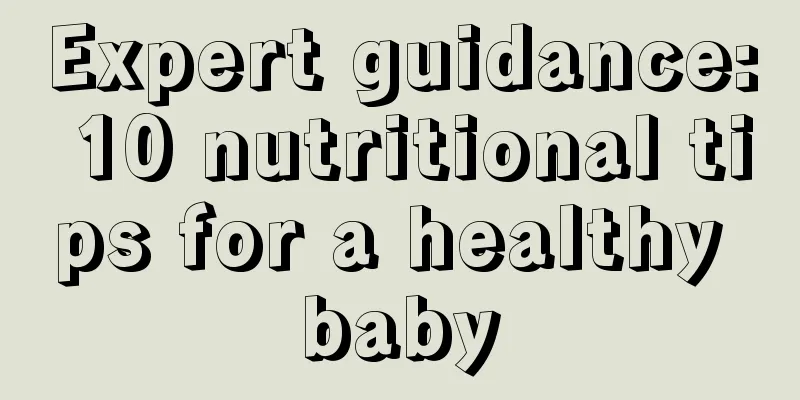Expert guidance: 10 nutritional tips for a healthy baby

|
Every mother hopes that her baby is healthy, but because the baby is young, he or she is very likely to get sick if you don't pay attention. Pediatric experts believe that more attention should be paid to children's health in summer. First, drink less beverages and more water Various beverages such as soda, juice, cola, etc. contain a lot of sugar and electrolytes. Excessive intake can affect appetite and digestive function. When children sweat a lot after exercise, it is best to drink more boiled water to replenish water.
Babies are prone to getting angry in the hot summer, but babies are in the growth and development period and have a greater demand for nutrition. A too light diet will lead to nutritional disorders. Therefore, the baby's diet in summer should be diversified and should be supplemented with fresh fish, fresh meat, fresh eggs, pork liver, etc.
There are many kinds of fruits and vegetables in summer, and parents often make some refreshing cold dishes. If babies accidentally eat too many raw and cold fruits and vegetables, it may lead to digestive disorders, vomiting, diarrhea, etc. Fourth, it is not advisable to take a cold shower after sweating a lot If you take a cold shower after sweating profusely, the pores all over your body will close quickly and the blood vessels will contract rapidly, which can affect the body's functions and make the baby more susceptible to illness. Fifth, the nap time should not be too long If you take a nap for too long, the central nervous system of the brain will be inhibited more deeply, causing the capillaries of brain cells to close too long, which will reduce the blood flow in the cerebral vessels and affect the baby's spirit after waking up. 6. Don’t stay in the air-conditioned room for too long Rooms where air conditioning is used for a long time have less fresh air because the doors and windows are closed. Children who stay in cold and dry air for too long will have reduced resistance of their respiratory and digestive tracts, which may cause upper respiratory tract infections and diarrhea. Seventh, drink more porridge and soup to replenish electrolytes 70-80% of a child's body is made up of water, and the amount of water required based on body weight is about three times that of an adult. Children should be provided with enough water-containing foods in summer, but it is more important to replenish the various minerals lost during sweating, especially sodium and potassium. When there is a lack of potassium in the body, babies are prone to heatstroke. Sweet drinks only contain sugar and water, but cannot provide electrolytes such as sodium, potassium, calcium, magnesium, nor do they contain vitamins. Therefore, mothers should not use sweet drinks to quench their babies' thirst, but should encourage their children to eat more fruits. They should also prepare nutritious porridge and heat-relief drinks at home, among which bean soup and bean porridge are most helpful in supplementing minerals. When providing soup to your baby, be sure to drink it in small amounts and multiple times, because excessive drinking may cause sudden and heavy sweating and may also cause your baby to lose appetite. Drinks just taken out of the refrigerator must be left at room temperature for a while before drinking. Eighth, eat more milk, eggs and beans Young children are in a period of rapid growth and protein is essential for their development. In high temperatures above 35°C, the human body will lose a lot of protein through sweating, and the decomposition of protein in the body will also increase. In hot weather, young children have poor appetite and are prone to insufficient protein intake. Mothers must note that snacks, drinks and cold drinks cannot provide enough protein for babies. Therefore, children should be given 1 cup of milk, 1 egg, soy products or bean porridge every day, and they should also eat lean meat and fish regularly to supplement iron. Nine is to eat more fruits, vegetables and whole grains to supply vitamins In summer, more vitamin C, vitamin B1 and vitamin B2 are lost through sweat every day. Lack of these vitamins makes people tired and has reduced resistance. It has been determined that the amount of water-soluble vitamins needed in hot weather is more than twice that of normal times. A good way to supplement vitamin C is to eat more vegetables and fruits. Good foods to supplement vitamin B1 are beans and whole grains. Good sources of vitamin B2 are milk and green leafy vegetables. With sufficient vitamins, your baby can be full of energy in the summer. Ten is to eat small and frequent meals In a high temperature environment, the secretion of digestive enzymes decreases and digestive function declines. Therefore, summer food should be light and refreshing, and the appearance and variety of food should be appetizing. The principle of seasoning is to use less oil and more vinegar; in terms of the frequency of meals, it is better to serve small meals frequently, and add appropriate meals during cool weather. Of course, one thing that cannot be ignored is ensuring food hygiene. |
<<: The 7 most beneficial early education methods for children's growth
>>: What to do if your child has a fever
Recommend
How to supplement zinc and iron deficiency in babies
For newborn babies, if they are deficient in zinc...
What are the causes of asthma in children?
Families are still very concerned about their chi...
What medicine is good for urinary tract infection in children?
Urinary tract infection in children is a relative...
Preserved jelly harms children's health
"June 1st" is a festival for children, ...
Why does the child's temple hurt?
The temple acupuncture point is very important to...
What to do if your 9-month-old baby has a stuffy nose?
It is very common for nine-month-old babies to ha...
Why Babies Struggle When Sleeping
Some mothers always complain that their children ...
Is fluid therapy effective for pediatric enteritis?
Many children suffer from enteritis problems, whi...
Physical cooling of a child with a high fever of 39 degrees
I know a lot of mothers, and they always say that...
What medicine is good for children with fever and cold
In summer, although the weather is relatively hot...
What should I do if my four-month-old baby has yellow urine?
Generally speaking, when the human body is in a h...
What is the treatment for urticaria in children?
Although childhood urticaria is not a serious dis...
Solutions for newborn baby frowning
We may have seen many children frowning. This sit...
What are the methods to stop diarrhea in children?
Children generally have weaker physical constitut...
What are the symptoms of testicular hernia in children?
Sometimes children will cry non-stop, and mothers...









